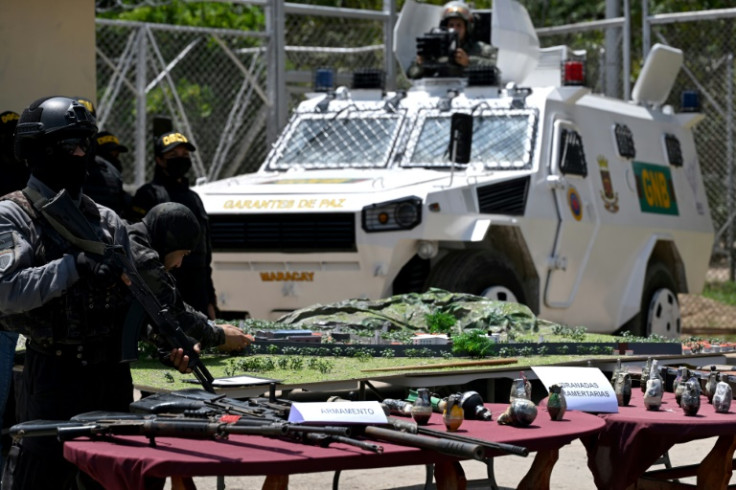
U.S. law enforcement and immigration officials have launched more than 100 investigations into Venezuela's Tren de Aragua gang, including sex trafficking in Louisiana and the point-blank shooting of two New York City police officers, NBC News reports. But as the gang becomes more known in the U.S., one question remains, how are they getting into the country?
El Tren de Aragua is a transnational criminal gang that originated in a Venezuelan prison and has slowly made its way south and north in recent years. Rumors allege that it is now operating in the U.S.
The scale of the gang's operation in the U.S. is unknown, but recent unrelated crimes, such as the cases in Louisiana and New York City and at least three other states, have been attributed to the group. In fact, some Republican members of Congress have asked the Biden administration "to formally designate the vicious Tren de Aragua as a Transnational Criminal Organization."
But despite these rumors and recent incidents, little reports have been done to understand how these gangs come into the U.S. So, how do they do it?
More than 330,000 Venezuelans crossed the U.S. border last year, according to Customs and Border Protection data, and Venezuela, like Cuba, China and a handful of other countries, doesn't provide any criminal history information to U.S. officials.
That is why, as former Border Patrol agent Ammon Blair told NBC News, unless agents get a Venezuelan migrant's criminal history from Interpol or "they already have a criminal record inside the United States, we won't know who they are."
Because of this, the NYPD now called them "ghost criminals," with little to identify them except gang tattoos.
In the June 3 New York shooting, for instance, which both victims survived, the alleged shooter had been encountered by the U.S. Border Patrol after having crossed into Texas illegally, according to New York Police. He was then released into the U.S. to await an asylum hearing. However, it remains unclear whether his alleged affiliation with Tren de Aragua was known to Venezuelan authorities.
"Their identity may be misrepresented; their date of birth may be misrepresented," said Jason Savino, assistant chief of detectives for the NYPD. "Everything about that individual could potentially be misrepresented."
When migrants cross the border and encounter Border Patrol, agents may ask the migrant for any identifying information, like a birth certificate or a passport. The agent then vets any information provided against a criminal database collected from U.S. agencies and foreign countries.
However, this is not a fool proof system, as "sometimes the smugglers will have [migrants] ditch their documents [so] they can declare a false name or a false nationality."
Border Patrol agents can also check other available sources of information about criminal behavior, including data provided by law enforcement in countries that migrants may pass through on their way to the U.S.
If a criminal history is found, an agent can place a migrant on a fast track for deportation.
A senior Department of Homeland Security official said CBP's ability to screen migrants has improved over the past five years as the agency reached more agreements with other countries to share law enforcement information and has surged resources to vetting at the border. But in a report made public Friday, DHS' Office of the Inspector General wrote that the department's "technology, procedures and coordination" at the border were "not fully effective" to screen and vet noncitizens and asylum seekers.
It remains unclear what measures U.S. officials will do to recognize gang members at the border. After all, there is little hard data about how much crime other migrants are committing once they're inside the U.S. But for now, GOP members of Congress led by Florida Sen. Marco Rubio is asking the Biden administration to take action, CNN reports.
In a letter sent to Biden, the legislators said "if left unchecked, they will unleash an unprecedented reign of terror, mirroring the devastation it has already inflicted in communities throughout Central and South America, more prominently in Colombia, Chile, Ecuador and Peru."
© 2024 Latin Times. All rights reserved. Do not reproduce without permission.







